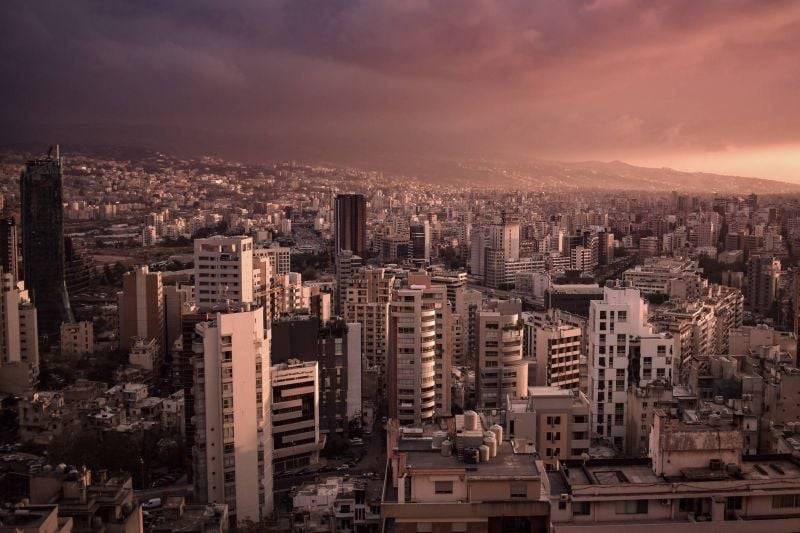
As clashes persist between Hezbollah and the Israeli army, many Lebanese people feel deep concern. (Credit: João Sousa/L'Orient-Le Jour)
Since the outbreak of war between Hamas and Israel on Oct. 7, every passing day raises fears of a regional escalation, with the opening of a front on the Lebanese-Israeli border at the forefront.
Despite international diplomacy issuing warnings against any escalation, belligerent rhetoric from both sides continues. "If Hezbollah intervenes, the devastation will be unimaginable," Israeli Prime Minister Benjamin Netanyahu said on Tuesday.
In this violent context, many people across the country are struggling with worry, anxiety and anguish. The fact that the country is facing its fourth year of economic crisis and is still recovering from the trauma of the Aug. 4 2020 explosion adds to the burden. Faced with this situation over which citizens have no control, confronted with information flow and violent images daily, how can one take care of oneself and one's mental health?
L'Orient-Le Jour posed the question to Nayla Karame-Majdalani and Albert Moukheiber, two Lebanese psychologists practicing respectively in Lebanon and in France. Here are their suggestions:
Act on Your Own Environment
"In an extremely uncertain situation, it's difficult to predict and plan ahead because we don't know what will happen, so we don't feel well," explained Albert Moukheiber. This uncertainty triggers worry based on a danger that is not real but probable.
"The danger exists, but one must stay in the present moment: Right now, there is no war [in Lebanon]," says Nayla Karame-Majdalani. While none of us can change the course of events and their present and future consequences, everyone can act within their immediate environment to contain their own concerns.
Practical tips
• Live in the present moment: Continue to lead one's life as normally as possible.
• Develop a Plan B: Stock up on essential supplies or consider alternative accommodations just in case.
• Maintain good digital hygiene: Turn off notifications, mute WhatsApp groups, allocate time without social media, avoid "doom-scrolling" (compulsive consumption of distressing information) and uninstall certain applications.
• Avoid being alone: Go to work, meet friends, go out, stay in touch with loved ones.
• Engage in activities: Exercise, entertain oneself, cook, read, watch movies, etc.
"It's necessary to keep busy to prevent our minds from constantly constructing catastrophic scenarios and succumbing to anxious and useless rumination," summarized Nayla Karame-Majdalani.
These scenarios we create, prompted by our fears, can sometimes lead to panic attacks, a total loss of control. In such moments, while consulting a specialist is ideal, being surrounded is also a solution, as "others will help us," said Albert Moukheiber, adding to his prescription breathing exercises or relaxation techniques like yoga.
Informing Children
Although reality is frightening, giving children the space to talk is reassuring and constructive. "What worries a child is not having an answer. Hiding reality makes them seek answers from others who may not necessarily have the capacity to address their fears and concerns," explained Nayla Karame-Majdalani. Thus, if a child asks questions, they should always be answered. It's also an opportunity to open a broader dialogue according to their age.
Practical tips
• Contextualize: Tell them , for example, about Palestine.
• Reassure: Present possible Plan Bs and show that caution is being exercised.
• Do not ask "why are you asking this question?" but simply answer.
• Take it seriously: Do not hide, lie, avoid or change the subject.
• Remove access to violent images and videos.
"If the child asks a question, something is happening in their mental space. We must address it," said Albert Moukheiber, adding that when the child stops asking questions, then the adult should stop providing information.
"The child must be able to turn to their parents. If they get an answer and are afraid, they are given the opportunity to share and thus be reassured," said Nayla Karame-Majdalani.
And When You Are Far Away?
"When you are far away, you are less in action. By reflex, one does things only to reassure oneself in the face of one's helplessness," explained Albert Moukheiber. This can involve being constantly on the phone or talking only about the situation with everyone. He said that the best thing to do when you are abroad with relatives in Lebanon is to set aside times when you get informed without constantly exposing yourself to the news.
"Most of us have already experienced a war; all these reflexes are therefore adapted to the current situation," Albert Moukheiber added. The idea is nonetheless not to fall into hyper-vigilance: Knowing that a rocket fell at a certain time does not give any more control over the situation. "If there is an attack, everyone will know," said Karame-Majdalani.